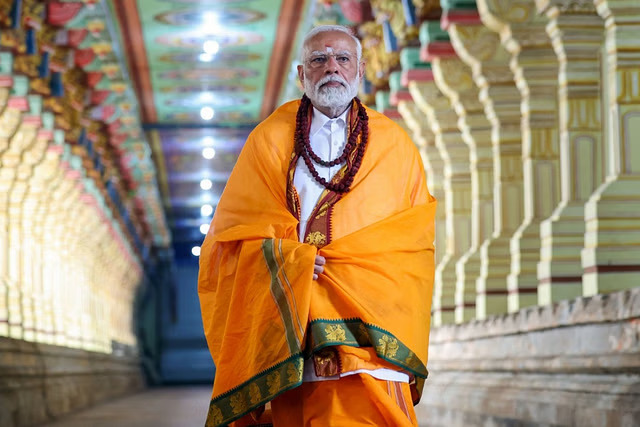Prime Minister Narendra Modi made numerous efforts towards continuous community and cultural outreach in Tamil Nadu during his second term. He repeatedly referenced Tamil as the oldest language (which caused dissatisfaction among those who consider Sanskrit to be the oldest), established the Sangam of Kashi and Saurashtra Tamils in Parliament, quoted verses from Thirukkural, and participated in Tamil New Year celebrations. During his recent visit to Tamil Nadu, Modi focused on the Vivekananda Rock Memorial in Kanyakumari.
Behind these efforts, there are no political motives.
However, Prime Minister Modi and the BJP continue to assert that these outreach initiatives are not driven by political motives, but politics cannot be entirely separated from these actions. This raises the question of whether PM Modi will devote as much attention to Tamil Nadu in his third term, particularly since the party did not achieve expected results in the state.
In the 2024 Lok Sabha elections, BJP increased its vote share in Tamil Nadu but did not win any seats, leading to discontent in states where the party historically performed well, such as Karnataka, sending a significant number of BJP MPs to Parliament for a long time.
Currently, it is difficult to say whether attention will remain focused on just one state or not, but it can certainly be said that focusing on Tamil Nadu cannot be blamed on Prime Minister Modi. At the same time, it seems that he is also focusing on Punjab.
Prime Minister Modi’s special and frequent outreach efforts towards the Sikh community are evident. He has been seen wearing a turban, cooking langar, and serving meals multiple times. In addition, a grand ceremony was organized at the Red Fort in Delhi on the 400th birth anniversary of Guru Teg Bahadur.
This is the reason.
Perhaps PM Modi is making these outreach efforts because he believes that both Tamil Nadu and Punjab are moving away from the national mainstream. While Tamil Nadu’s case is due to Dravidian ideology, Punjab’s case is due to increased support for Khalistan.
Kerala also holds special importance for PM Modi.
Another state where PM Modi is considering broader outreach this time is Kerala. The process is ongoing; he has visited the state several times and, as a strategic move before the 2026 Assembly elections, included George Kurian, a loyal leader of the Christian community, in his cabinet.
Regarding Tamil Nadu, this state will continue to be of great importance in PM Modi’s third term. Efforts will continue to maximize the impact of the Bharatiya Janata Party in Tamil Nadu, and it will be crucial to see how this state integrates into BJP’s long-term plans.
In addition to Tamil Nadu, Punjab and Kerala will also remain centers of special interest for Prime Minister Modi. These states are crucial from cultural, social, and political perspectives and will continue to be part of Modi government’s efforts. Time will tell how effective BJP’s strategies are in these states, but it is clear that Prime Minister Modi considers these states to be of special importance.
Conclusion
While Tamil Nadu holds significant importance, Prime Minister Modi’s strategic vision embraces a broader regional strategy that includes states such as Punjab and Kerala. This approach highlights his astute grasp of regional dynamics and electoral strategies.
PM Modi’s agenda transcends singular focus, showcasing a multifaceted approach to regional engagement. This strategic diversity underscores Modi’s adaptive leadership, adeptly navigating India’s intricate political terrain while fostering inclusive development and cultural integration across diverse states.
His efforts signify a cohesive national framework underpinned by tailored regional initiatives, reinforcing his commitment to holistic progress and unity amidst India’s diverse socio-political fabric.
ALSO READ: The increasing number of Rohingya Infiltrators in India: Causes and Consequences
